International Business Strategy: Volkswagen in the Russian Market
VerifiedAdded on 2022/09/17
|5
|1084
|19
Report
AI Summary
This report examines Volkswagen's direct investment in the Russian market, analyzing the motivating factors behind the decision, including competitive pressures and the projected growth of the Russian car market. It explores the application of Greenfield investment and joint venture theories to Volkswagen's FDI strategy, highlighting the benefits and potential downsides of FDI for the Russian economy, such as increased production and competition versus capital outflow. The report further investigates the impact of falling oil prices on FDI in Russia and Volkswagen's decision to continue operations despite economic challenges. The analysis considers the implications of this decision, including the sunk costs and long-term market potential, concluding with the uncertain effectiveness of the strategy based on market trends.
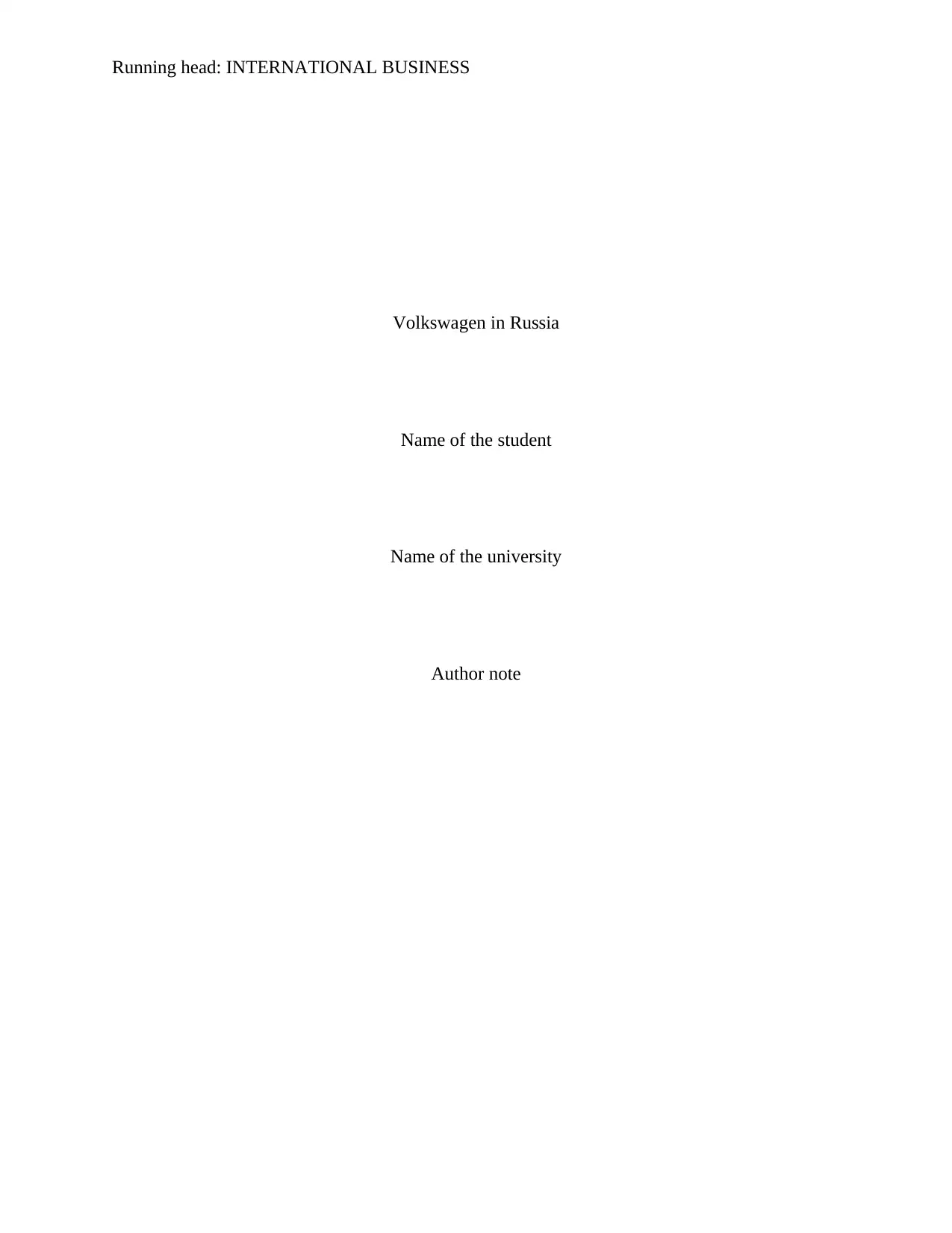
Running head: INTERNATIONAL BUSINESS
Volkswagen in Russia
Name of the student
Name of the university
Author note
Volkswagen in Russia
Name of the student
Name of the university
Author note
Paraphrase This Document
Need a fresh take? Get an instant paraphrase of this document with our AI Paraphraser
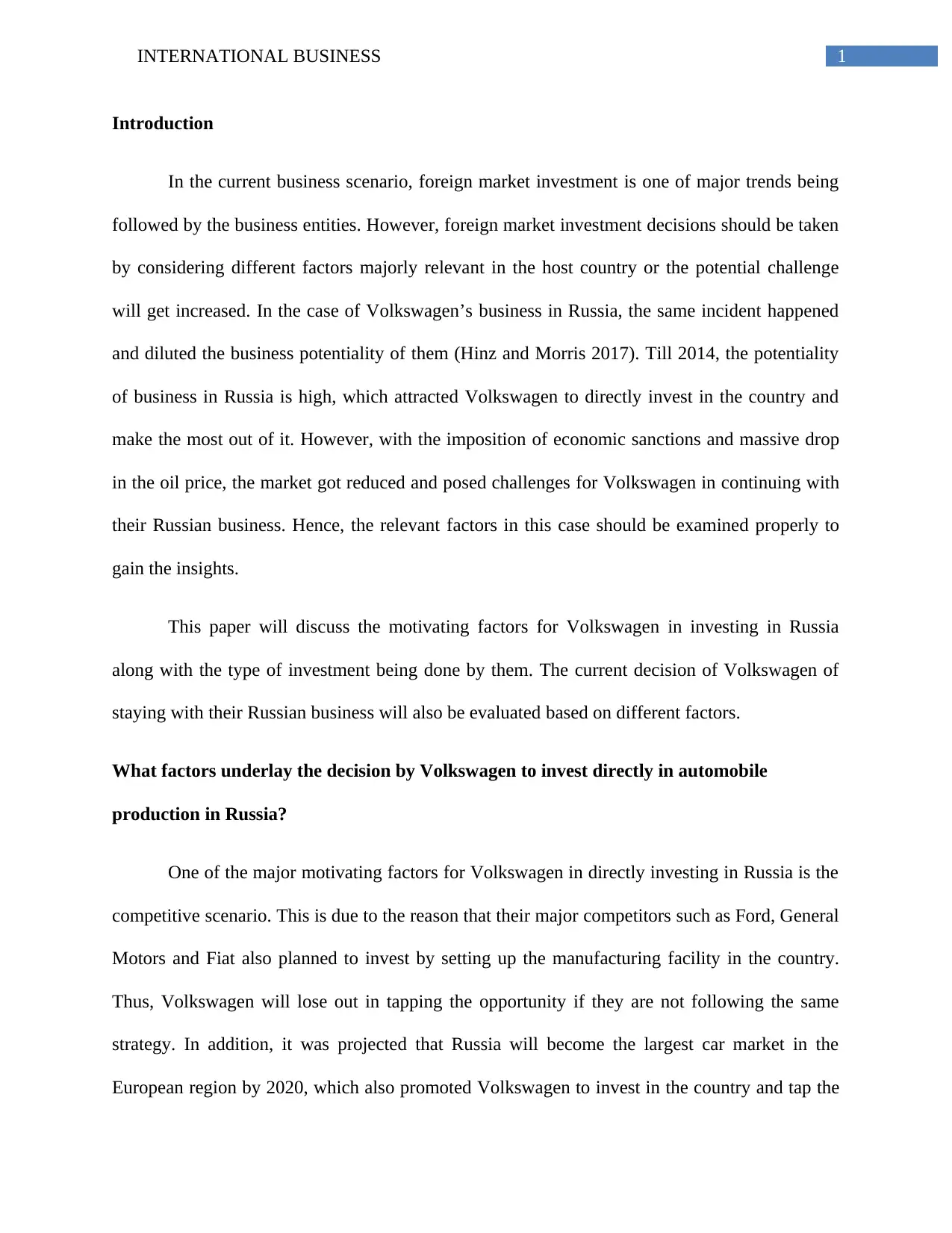
1INTERNATIONAL BUSINESS
Introduction
In the current business scenario, foreign market investment is one of major trends being
followed by the business entities. However, foreign market investment decisions should be taken
by considering different factors majorly relevant in the host country or the potential challenge
will get increased. In the case of Volkswagen’s business in Russia, the same incident happened
and diluted the business potentiality of them (Hinz and Morris 2017). Till 2014, the potentiality
of business in Russia is high, which attracted Volkswagen to directly invest in the country and
make the most out of it. However, with the imposition of economic sanctions and massive drop
in the oil price, the market got reduced and posed challenges for Volkswagen in continuing with
their Russian business. Hence, the relevant factors in this case should be examined properly to
gain the insights.
This paper will discuss the motivating factors for Volkswagen in investing in Russia
along with the type of investment being done by them. The current decision of Volkswagen of
staying with their Russian business will also be evaluated based on different factors.
What factors underlay the decision by Volkswagen to invest directly in automobile
production in Russia?
One of the major motivating factors for Volkswagen in directly investing in Russia is the
competitive scenario. This is due to the reason that their major competitors such as Ford, General
Motors and Fiat also planned to invest by setting up the manufacturing facility in the country.
Thus, Volkswagen will lose out in tapping the opportunity if they are not following the same
strategy. In addition, it was projected that Russia will become the largest car market in the
European region by 2020, which also promoted Volkswagen to invest in the country and tap the
Introduction
In the current business scenario, foreign market investment is one of major trends being
followed by the business entities. However, foreign market investment decisions should be taken
by considering different factors majorly relevant in the host country or the potential challenge
will get increased. In the case of Volkswagen’s business in Russia, the same incident happened
and diluted the business potentiality of them (Hinz and Morris 2017). Till 2014, the potentiality
of business in Russia is high, which attracted Volkswagen to directly invest in the country and
make the most out of it. However, with the imposition of economic sanctions and massive drop
in the oil price, the market got reduced and posed challenges for Volkswagen in continuing with
their Russian business. Hence, the relevant factors in this case should be examined properly to
gain the insights.
This paper will discuss the motivating factors for Volkswagen in investing in Russia
along with the type of investment being done by them. The current decision of Volkswagen of
staying with their Russian business will also be evaluated based on different factors.
What factors underlay the decision by Volkswagen to invest directly in automobile
production in Russia?
One of the major motivating factors for Volkswagen in directly investing in Russia is the
competitive scenario. This is due to the reason that their major competitors such as Ford, General
Motors and Fiat also planned to invest by setting up the manufacturing facility in the country.
Thus, Volkswagen will lose out in tapping the opportunity if they are not following the same
strategy. In addition, it was projected that Russia will become the largest car market in the
European region by 2020, which also promoted Volkswagen to invest in the country and tap the
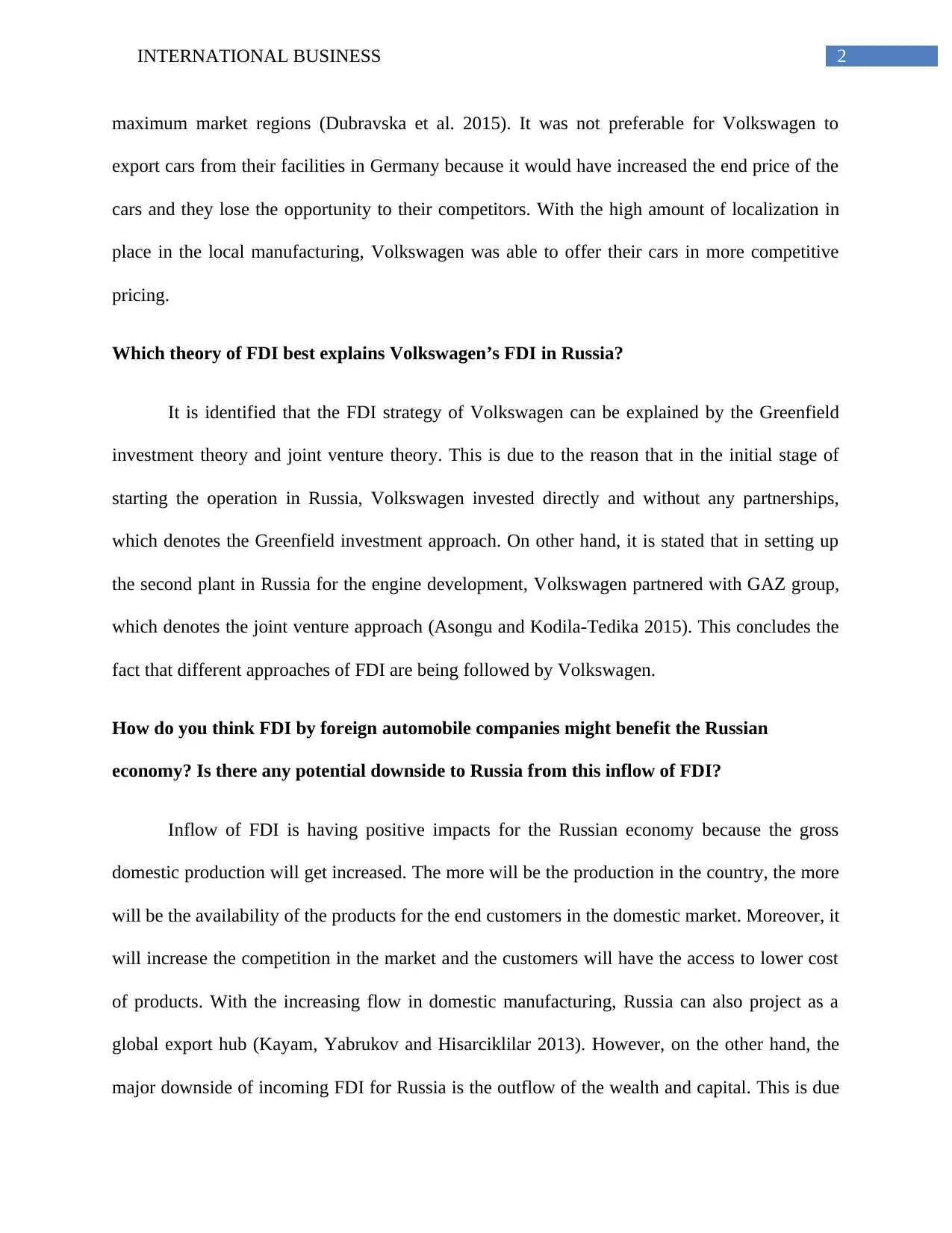
2INTERNATIONAL BUSINESS
maximum market regions (Dubravska et al. 2015). It was not preferable for Volkswagen to
export cars from their facilities in Germany because it would have increased the end price of the
cars and they lose the opportunity to their competitors. With the high amount of localization in
place in the local manufacturing, Volkswagen was able to offer their cars in more competitive
pricing.
Which theory of FDI best explains Volkswagen’s FDI in Russia?
It is identified that the FDI strategy of Volkswagen can be explained by the Greenfield
investment theory and joint venture theory. This is due to the reason that in the initial stage of
starting the operation in Russia, Volkswagen invested directly and without any partnerships,
which denotes the Greenfield investment approach. On other hand, it is stated that in setting up
the second plant in Russia for the engine development, Volkswagen partnered with GAZ group,
which denotes the joint venture approach (Asongu and Kodila-Tedika 2015). This concludes the
fact that different approaches of FDI are being followed by Volkswagen.
How do you think FDI by foreign automobile companies might benefit the Russian
economy? Is there any potential downside to Russia from this inflow of FDI?
Inflow of FDI is having positive impacts for the Russian economy because the gross
domestic production will get increased. The more will be the production in the country, the more
will be the availability of the products for the end customers in the domestic market. Moreover, it
will increase the competition in the market and the customers will have the access to lower cost
of products. With the increasing flow in domestic manufacturing, Russia can also project as a
global export hub (Kayam, Yabrukov and Hisarciklilar 2013). However, on the other hand, the
major downside of incoming FDI for Russia is the outflow of the wealth and capital. This is due
maximum market regions (Dubravska et al. 2015). It was not preferable for Volkswagen to
export cars from their facilities in Germany because it would have increased the end price of the
cars and they lose the opportunity to their competitors. With the high amount of localization in
place in the local manufacturing, Volkswagen was able to offer their cars in more competitive
pricing.
Which theory of FDI best explains Volkswagen’s FDI in Russia?
It is identified that the FDI strategy of Volkswagen can be explained by the Greenfield
investment theory and joint venture theory. This is due to the reason that in the initial stage of
starting the operation in Russia, Volkswagen invested directly and without any partnerships,
which denotes the Greenfield investment approach. On other hand, it is stated that in setting up
the second plant in Russia for the engine development, Volkswagen partnered with GAZ group,
which denotes the joint venture approach (Asongu and Kodila-Tedika 2015). This concludes the
fact that different approaches of FDI are being followed by Volkswagen.
How do you think FDI by foreign automobile companies might benefit the Russian
economy? Is there any potential downside to Russia from this inflow of FDI?
Inflow of FDI is having positive impacts for the Russian economy because the gross
domestic production will get increased. The more will be the production in the country, the more
will be the availability of the products for the end customers in the domestic market. Moreover, it
will increase the competition in the market and the customers will have the access to lower cost
of products. With the increasing flow in domestic manufacturing, Russia can also project as a
global export hub (Kayam, Yabrukov and Hisarciklilar 2013). However, on the other hand, the
major downside of incoming FDI for Russia is the outflow of the wealth and capital. This is due
⊘ This is a preview!⊘
Do you want full access?
Subscribe today to unlock all pages.

Trusted by 1+ million students worldwide
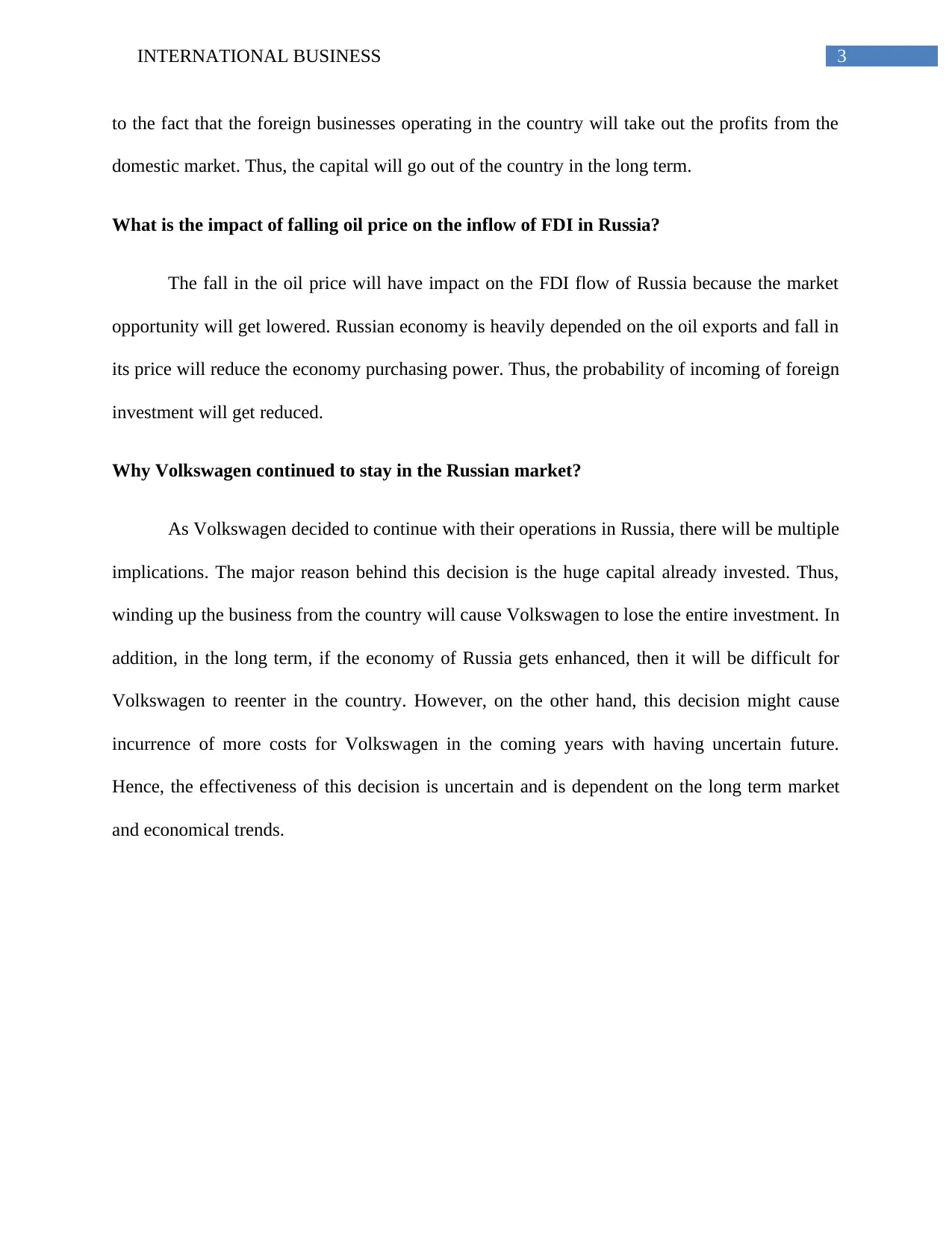
3INTERNATIONAL BUSINESS
to the fact that the foreign businesses operating in the country will take out the profits from the
domestic market. Thus, the capital will go out of the country in the long term.
What is the impact of falling oil price on the inflow of FDI in Russia?
The fall in the oil price will have impact on the FDI flow of Russia because the market
opportunity will get lowered. Russian economy is heavily depended on the oil exports and fall in
its price will reduce the economy purchasing power. Thus, the probability of incoming of foreign
investment will get reduced.
Why Volkswagen continued to stay in the Russian market?
As Volkswagen decided to continue with their operations in Russia, there will be multiple
implications. The major reason behind this decision is the huge capital already invested. Thus,
winding up the business from the country will cause Volkswagen to lose the entire investment. In
addition, in the long term, if the economy of Russia gets enhanced, then it will be difficult for
Volkswagen to reenter in the country. However, on the other hand, this decision might cause
incurrence of more costs for Volkswagen in the coming years with having uncertain future.
Hence, the effectiveness of this decision is uncertain and is dependent on the long term market
and economical trends.
to the fact that the foreign businesses operating in the country will take out the profits from the
domestic market. Thus, the capital will go out of the country in the long term.
What is the impact of falling oil price on the inflow of FDI in Russia?
The fall in the oil price will have impact on the FDI flow of Russia because the market
opportunity will get lowered. Russian economy is heavily depended on the oil exports and fall in
its price will reduce the economy purchasing power. Thus, the probability of incoming of foreign
investment will get reduced.
Why Volkswagen continued to stay in the Russian market?
As Volkswagen decided to continue with their operations in Russia, there will be multiple
implications. The major reason behind this decision is the huge capital already invested. Thus,
winding up the business from the country will cause Volkswagen to lose the entire investment. In
addition, in the long term, if the economy of Russia gets enhanced, then it will be difficult for
Volkswagen to reenter in the country. However, on the other hand, this decision might cause
incurrence of more costs for Volkswagen in the coming years with having uncertain future.
Hence, the effectiveness of this decision is uncertain and is dependent on the long term market
and economical trends.
Paraphrase This Document
Need a fresh take? Get an instant paraphrase of this document with our AI Paraphraser
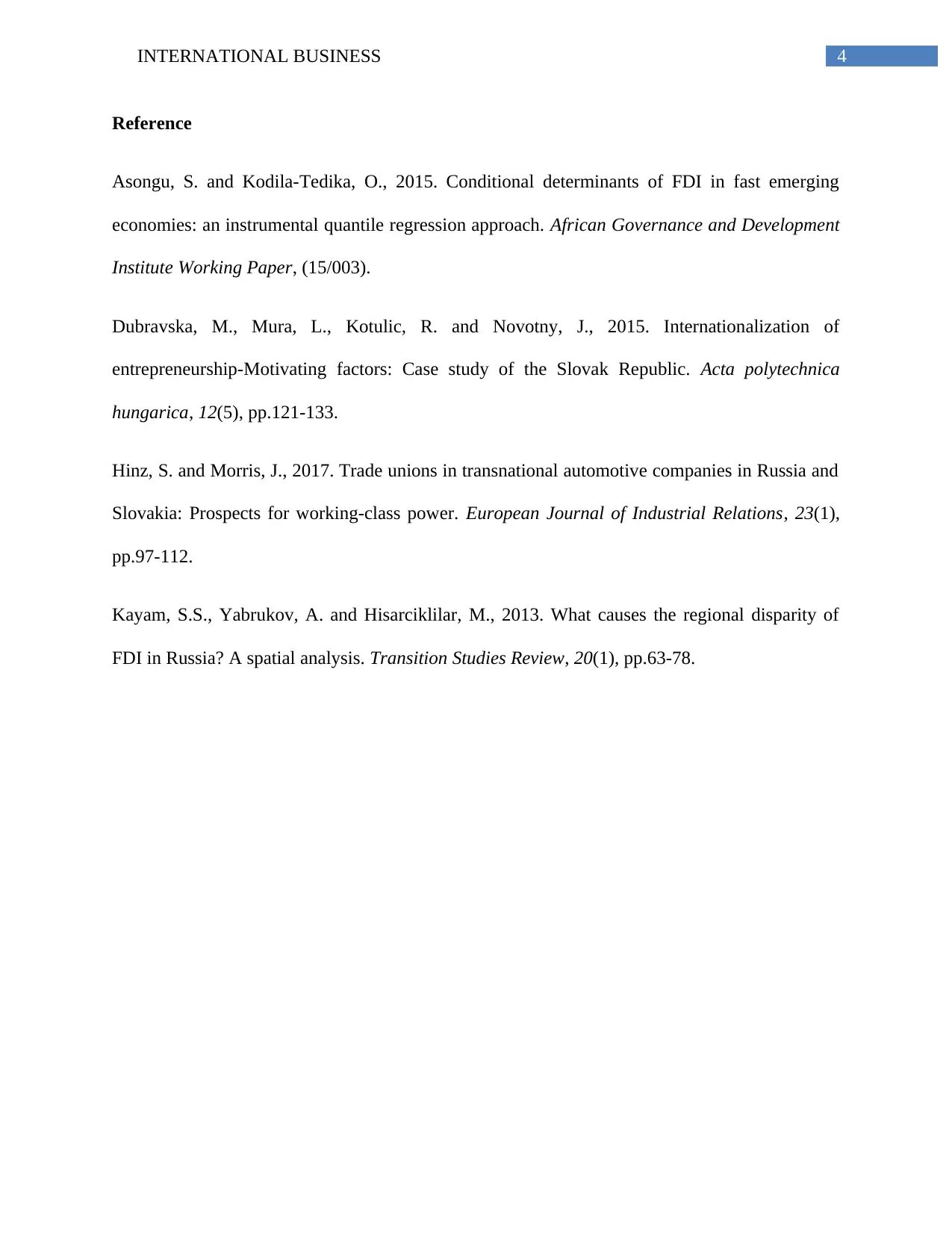
4INTERNATIONAL BUSINESS
Reference
Asongu, S. and Kodila-Tedika, O., 2015. Conditional determinants of FDI in fast emerging
economies: an instrumental quantile regression approach. African Governance and Development
Institute Working Paper, (15/003).
Dubravska, M., Mura, L., Kotulic, R. and Novotny, J., 2015. Internationalization of
entrepreneurship-Motivating factors: Case study of the Slovak Republic. Acta polytechnica
hungarica, 12(5), pp.121-133.
Hinz, S. and Morris, J., 2017. Trade unions in transnational automotive companies in Russia and
Slovakia: Prospects for working-class power. European Journal of Industrial Relations, 23(1),
pp.97-112.
Kayam, S.S., Yabrukov, A. and Hisarciklilar, M., 2013. What causes the regional disparity of
FDI in Russia? A spatial analysis. Transition Studies Review, 20(1), pp.63-78.
Reference
Asongu, S. and Kodila-Tedika, O., 2015. Conditional determinants of FDI in fast emerging
economies: an instrumental quantile regression approach. African Governance and Development
Institute Working Paper, (15/003).
Dubravska, M., Mura, L., Kotulic, R. and Novotny, J., 2015. Internationalization of
entrepreneurship-Motivating factors: Case study of the Slovak Republic. Acta polytechnica
hungarica, 12(5), pp.121-133.
Hinz, S. and Morris, J., 2017. Trade unions in transnational automotive companies in Russia and
Slovakia: Prospects for working-class power. European Journal of Industrial Relations, 23(1),
pp.97-112.
Kayam, S.S., Yabrukov, A. and Hisarciklilar, M., 2013. What causes the regional disparity of
FDI in Russia? A spatial analysis. Transition Studies Review, 20(1), pp.63-78.
1 out of 5
Related Documents
Your All-in-One AI-Powered Toolkit for Academic Success.
+13062052269
info@desklib.com
Available 24*7 on WhatsApp / Email
![[object Object]](/_next/static/media/star-bottom.7253800d.svg)
Unlock your academic potential
Copyright © 2020–2025 A2Z Services. All Rights Reserved. Developed and managed by ZUCOL.





